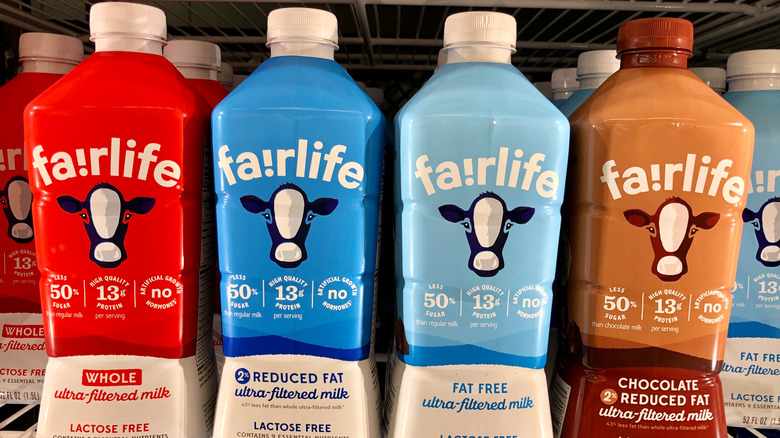Is Fairlife Milk Good For You?
Remember all the "milk moustache" ads that circulated for years alongside the slogan "Got milk?"? Well, nowadays a milk moustache might just as easily feature almond, soy, rice, or hemp milk — or one of the new kids on the block, Fairlife milk.
Fairlife, unlike all of the non-dairy milk alternatives listed above, is actually milk that comes from cows (via Men's Health). What makes it unique is a special filtration process that the milk is put through, which separates the basic milk components — fat, water, minerals, protein, and lactose (milk sugar) — and then recombines them into an ultra-filtered milk that has a significantly different nutritional composition than the original product. And this is what excites Men's Health nutrition advisor Mike Roussell, who says, simply, "It takes milk and makes it better."
Compared with regular 2% milk, Fairlife milk has significantly more protein and calcium — 13 grams and 380 milligrams, compared with 8 grams and 283 milligrams, respectively — and about half the sugar and carbs. It is also lactose-free, which is great news for the millions of Americans who are lactose-intolerant (via Eat This, Not That!). Another bonus — Fairlife milk has a longer shelf life than regular milk, and can stay fresh for about 90 days, unopened (via The Coca-Cola Company).
Fairlife milk offers athletes extra protein
So, what's not to love about this premium milk? Well, the price, for one. Fairlife milk is about double the cost of its conventional counterpart, which is a drawback especially for families that consume large amounts of milk each week (via Men's Health). Also, some nutritionists question whether the extra nutrition that the milk is hyped as offering is really necessary for most people. Registered dietitian Keri Gans says, "Milk is already a great package of nutrients; I'm not quite sure why it needs to be changed," and nutritionist Alissa Rumsey adds, "When you really look at the numbers, it can sound appealing, but in general most Americans are already getting enough protein" (via New York Daily News). So, why fix something that's not broken?
While families in general may not want to pay the extra price for ultra-filtered milk, there are some that could really benefit from Fairlife's unique nutritional profile. Athletes recovering from intense workouts, those looking to up their calcium intake (like those at risk of osteoporosis), and, of course, the lactose-intolerant, are likely to find Fairlife milk an excellent addition to their diets.


